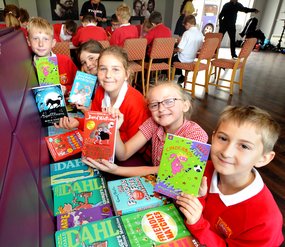
In 2023, more children who received free school meals (FSMs) told us they did not have a book of their own compared with the year before (12.4% in 2023 vs 9.7% in 2022).
Reading for pleasure has lifelong academic and economic benefits and children and young people who have books of their own at home report reading more often, and enjoying reading more, than those who do not. Book ownership is also associated with better reading performance. Indeed, a 2023 study found it was one of the top three predictors of children’s reading performance.
The cost-of-living crisis has a direct impact on families’ ability to support reading at home. More than 1 in 3 (36.1%) parents who were struggling financially as a result of the cost-of-living crisis told us they were buying fewer books for their children in early 2023.
Key findings
- In 2023, over 9 in 10 (91.4%) children and young people aged 5 to 18 said that they had a book of their own at home, meaning that 1 in 12 (8.6%) did not.
There were differences by age group:
- More than 9 in 10 (92.9%) children and young people aged 8 to 18 said in 2023 that they had a book of their own at home, meaning that 1 in 14 (7.1%) did not. The percentage reporting having a book has decreased since 2021 and is currently at its lowest level for five years (92.9% in 2023 vs 93.3% in 2019).
- Fewer children aged 5 to 8 said they had a book of their own compared with their older peers. In 2023, 4 in 5 (80.8%) children aged 5 to 8 told us they had a book of their own at home, meaning that 1 in 5 (19.2%) did not. This is, by a slight margin, the highest percentage since we first asked this age group in 2019, when it stood at 18.6%.
There were also differences by socio-economic background:
- In 2023, 1 in 8 (12.4%) of 8- to 18-year-olds receiving free school meals (FSMs) said they did not have a book of their own. This is an increase on 2022, when 1 in 10 (9.7%) of this group said the same.
- This is double the percentage of their peers who did not receive FSMs (12.4% vs 5.8%). The percentage-point (pp) gap in book ownership between children and young people who receive FSMs and their peers who do not (6.6 pp) is now at its largest in a decade.
Acknowledging the associations between book ownership and reading enjoyment, attainment and longer-term outcomes, it is essential that support for book ownership should be targeted at groups with the most to benefit, including children and young people from lower-income backgrounds.